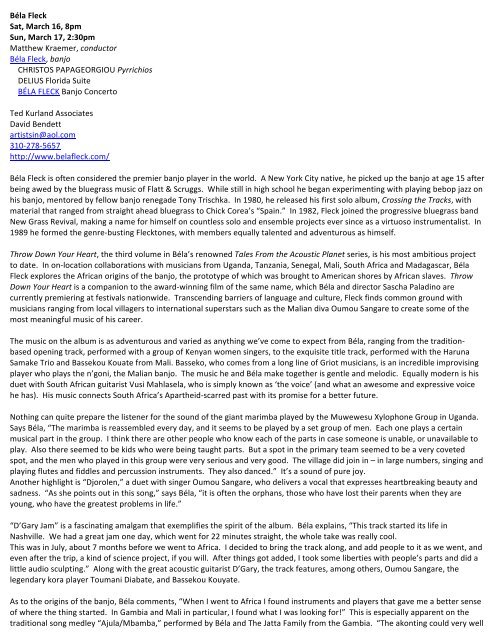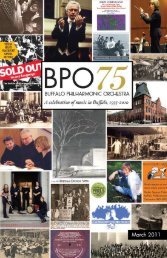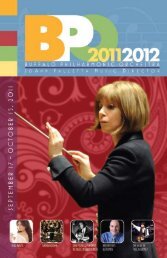Classics 2012-2013 Biographies - The Buffalo Philharmonic Orchestra
Classics 2012-2013 Biographies - The Buffalo Philharmonic Orchestra
Classics 2012-2013 Biographies - The Buffalo Philharmonic Orchestra
You also want an ePaper? Increase the reach of your titles
YUMPU automatically turns print PDFs into web optimized ePapers that Google loves.
Béla Fleck<br />
Sat, March 16, 8pm<br />
Sun, March 17, 2:30pm<br />
Matthew Kraemer, conductor<br />
Béla Fleck, banjo<br />
CHRISTOS PAPAGEORGIOU Pyrrichios<br />
DELIUS Florida Suite<br />
BÉLA FLECK Banjo Concerto<br />
Ted Kurland Associates<br />
David Bendett<br />
artistsin@aol.com<br />
310-‐278-‐5657<br />
http://www.belafleck.com/<br />
Béla Fleck is often considered the premier banjo player in the world. A New York City native, he picked up the banjo at age 15 after<br />
being awed by the bluegrass music of Flatt & Scruggs. While still in high school he began experimenting with playing bebop jazz on<br />
his banjo, mentored by fellow banjo renegade Tony Trischka. In 1980, he released his first solo album, Crossing the Tracks, with<br />
material that ranged from straight ahead bluegrass to Chick Corea’s “Spain.” In 1982, Fleck joined the progressive bluegrass band<br />
New Grass Revival, making a name for himself on countless solo and ensemble projects ever since as a virtuoso instrumentalist. In<br />
1989 he formed the genre-‐busting Flecktones, with members equally talented and adventurous as himself.<br />
Throw Down Your Heart, the third volume in Béla’s renowned Tales From the Acoustic Planet series, is his most ambitious project<br />
to date. In on-‐location collaborations with musicians from Uganda, Tanzania, Senegal, Mali, South Africa and Madagascar, Béla<br />
Fleck explores the African origins of the banjo, the prototype of which was brought to American shores by African slaves. Throw<br />
Down Your Heart is a companion to the award-‐winning film of the same name, which Béla and director Sascha Paladino are<br />
currently premiering at festivals nationwide. Transcending barriers of language and culture, Fleck finds common ground with<br />
musicians ranging from local villagers to international superstars such as the Malian diva Oumou Sangare to create some of the<br />
most meaningful music of his career.<br />
<strong>The</strong> music on the album is as adventurous and varied as anything we’ve come to expect from Béla, ranging from the tradition-‐<br />
based opening track, performed with a group of Kenyan women singers, to the exquisite title track, performed with the Haruna<br />
Samake Trio and Bassekou Kouate from Mali. Basseko, who comes from a long line of Griot musicians, is an incredible improvising<br />
player who plays the n’goni, the Malian banjo. <strong>The</strong> music he and Béla make together is gentle and melodic. Equally modern is his<br />
duet with South African guitarist Vusi Mahlasela, who is simply known as ‘the voice’ (and what an awesome and expressive voice<br />
he has). His music connects South Africa’s Apartheid-‐scarred past with its promise for a better future.<br />
Nothing can quite prepare the listener for the sound of the giant marimba played by the Muwewesu Xylophone Group in Uganda.<br />
Says Béla, “<strong>The</strong> marimba is reassembled every day, and it seems to be played by a set group of men. Each one plays a certain<br />
musical part in the group. I think there are other people who know each of the parts in case someone is unable, or unavailable to<br />
play. Also there seemed to be kids who were being taught parts. But a spot in the primary team seemed to be a very coveted<br />
spot, and the men who played in this group were very serious and very good. <strong>The</strong> village did join in – in large numbers, singing and<br />
playing flutes and fiddles and percussion instruments. <strong>The</strong>y also danced.” It’s a sound of pure joy.<br />
Another highlight is “Djorolen,” a duet with singer Oumou Sangare, who delivers a vocal that expresses heartbreaking beauty and<br />
sadness. “As she points out in this song,” says Béla, “it is often the orphans, those who have lost their parents when they are<br />
young, who have the greatest problems in life.”<br />
“D’Gary Jam” is a fascinating amalgam that exemplifies the spirit of the album. Béla explains, “This track started its life in<br />
Nashville. We had a great jam one day, which went for 22 minutes straight, the whole take was really cool.<br />
This was in July, about 7 months before we went to Africa. I decided to bring the track along, and add people to it as we went, and<br />
even after the trip, a kind of science project, if you will. After things got added, I took some liberties with people’s parts and did a<br />
little audio sculpting.” Along with the great acoustic guitarist D’Gary, the track features, among others, Oumou Sangare, the<br />
legendary kora player Toumani Diabate, and Bassekou Kouyate.<br />
As to the origins of the banjo, Béla comments, “When I went to Africa I found instruments and players that gave me a better sense<br />
of where the thing started. In Gambia and Mali in particular, I found what I was looking for!” This is especially apparent on the<br />
traditional song medley “Ajula/Mbamba,” performed by Béla and <strong>The</strong> Jatta Family from the Gambia. “<strong>The</strong> akonting could very well






